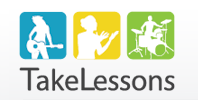Thursday, April 11, 2013
Empowering Music Teachers With TakeLessons' Online Marketplace

One of the biggest areas where the Internet has been shaping our everyday life, is how it has begun to empower people to earn money and a living in brand new ways. There are now a large number of online, peer-to-peer marketplaces which all aim at one thing; helping connecting people with others, so that they can offer their services or goods (a room for rent, a ride, a vacation timeshare, a dog sitter, etc.) to others, in a highly efficient way. One of the companies which has been helping to power that revolution is TakeLessons (www.takelessons.com), a San Diego company which helps music teachers find students, both for in-person lessons as well as for online teaching sessions. We caught up with Steven Cox, the company's CEO, to learn more about the company.
What is TakeLessons?

Steven Cox: We are a marketplace that helps service providers make a living, doing what they like to do. In essence, what we do is curate a marketplace. Our job is to find the best instructors out there, do the curation on both the front end of the operation, as well as let our consumer base and clients provide direct feedback on how that service provider is doing. Over time, that service provider gets a quality score. The better they do, the more students they will receive from us. The goal is to curate and find the best service providers, and help them make a living what they love to do. I don't know if you've heard, but it's actually tough for music teachers, tutors, and others to truly find enough customers to pay their bills and keep them involved in their passions. Our marketplace helps them find new customers, and also provides a suite of tools for scheduling, billing, and other things that they can use to manage their lives and make it easier to do business.
Why did you start the company?
Steven Cox: I've been doing Internet startups since 1998. That's actually all I know. I come from a very musically oriented family. My grandparents cut records, my parents cut records, and my brothers are session players. I'm the least musically oriented person out of the entire group, but I always played in bands. I actually paid my way through school working as a DJ and playing in a band, and was the lead singer in a rock band here.
I was just doing that for fun, but my band mates were trying to make a living doing that. One of them, in particular, Enrique, our drummer, is an awesome guy, and has a masters in music performance. He was really trying his best to make a run at paying bills through music. One day, after a gig, he sat down with me and told me he had to quit the band. I remember thinking--that's not good. He's really good, and if he quits, we'll have to forget it, the band will be over. I asked him what the deal was, and he told me that he had just gotten married, and had a brand new baby on the way, and that he was going to quit music because he had to get a "real job"--being a cook at Chili's.
I looked at him, and you could just see that his heart and eyes were beaten, beaten with a stick. It was the last thing he wanted to do. But, it was what he had to do for his family. We got to talking, and I asked him if he'd been teaching. He mentioned he had a poster up at the local drugstore, but he just couldn't get anyone to call him. I asked him--why didn't he use the Internet for that? He said something that we've now heard over and over--he was good at music, but when it came to marketing and Internet, it was just not his skillset, and he didn't know how to do that. I said I would help him, and we parlayed that into the thesis behind the company. The idea is that products have moved to the web in a big way. Five or six years ago, when we started, Amazon was crushing it, and Zappos was crushing it. We had a general thesis that, at some point in the future, services will also move to the web, in the same way that products had moved to the web.
People were becoming more and more comfortable, over time, buying things over the internet. So, to keep my bandmate out of Chili's, we started TakeLessons. It was a novel concept, which was help him to make enough money to be involved and stay in music, because he's really good at it. He still teaches for us today, and he never took a job with Chili's. It's been six years, and he's still able to make a living playing music, and doing things that he's super passionate about.
Who's your ideal customer for this?
Steven Cox: We consider the teacher our customer, and that's who the software is built for. Where we see, statistically, on what kind of instruments around the nation are doing well, we find that first, the largest metro areas are where we tend to do well. There's simply more culture and business coming out of those areas. More people there are attuned to finding an instrument, and more people are involved in teaching there as well. From an instrument point of view, if you look at the 80/20 view of things, 80 percent of our business comes from our top instrument, which is voice. Everyone wants to sing, which is awesome, and in that case you just need your voice, versus having to have an instrument. The second is guitar, and the third is keyboard. Farther down the list are things like drums, violin, and bass guitar. Those are the main ones we focus on.
So are these lessons online or in person--it looks like recently online through things like Skype with some offline?
Steven Cox: It's actually the reverse for us. When we started the business, the whole goal was to help the service provider driving around and giving lessons. That's still the bulk of the lessons, and that will remain the bulk of our business for some time. We are now covering 3,000 cities for physical instructors, who will show up on your doorstep to teach your kids instruments. There's a very nice, large robust marketplace to help you find a service provider in your local area. Last year, we started testing the idea of online music lessons and how that would work. The idea was around one-on-one, not prerecorded, live solo session with an instructor. We'd tried it in the past, but we found that the latency and experience just wasn't what people were expecting. What's happened since July, when we started testing it with voice, is we've now expanded that to guitar and keyboard as well. What we're seeing, is a certain percentage of the population really, really digs the idea of online, one-on-one lessons.
The reasons for those are: one, they don't want to get in their car and drive across town. Especially in a place like the East Coast, where it's snowing, they just don't want to get out to drive to their instructor. That's favorable for us. It's just more convenient in some cases. We also see that, as video technology and platforms, and platforms grow and Internet connections grow stronger, and as the quality of HD video has started to develop, people are more in favor of online lessons as well. Those factors have allowed us to take our market size from 3000 cities, to where we are now, to literally coverage in 30,000 cities across the U.S.
The interesting thing, is it's not just local. One of my favorite stories is a gentleman of 72, who looked us up from Padua, Kentucky. He wanted to learn ukulele, and had been trying to learn for six or seven years. But, in Padua Kentucky, there are no ukulele instructors. We hooked him up with our customer, Ramone, who is on the Big Island, and is a professional ukulele instructor. Now this gentleman is learning ukulele from a great instructor, who he'd never had access to prior to finding us. That's the great thing about the marketplace, which allows your location to be agnostic to learning. It helps both sides of the marketplace. Instructors are no longer limited to finding business in a ten mile radius of where they live, and students no longer are restricted to someone besides them to learn from. We've seen a sizeable uptick in that business, even though it's still a minority share of our business today.
What makes the most successful instructors on your site?
Steve Cox: We've found that folks who have been educated to some degree--not necessarily a Ph.D., but someone who has studied music, or studied the art of teaching, have a tendency to do better. It's very different from the art of playing. Those who have studied music education and have a couple of years of experience tend to do best. We also provide a best practices document, and we guide our instructors to help them retain students longer. But, the number one thing students need, more than anything else, is is someone who wants to make it an awesome experience playing. The whole idea of the old lady busting your knuckles over a piano when you make a mistake is antithetical to what really happens in a good relationships. The instructor is a mentor and guide, and by helping younger students get involved in music they like, rather than teaching out of a book that's classically based, we find that the younger person has the tendency to practice longer, and the more they practice, the better they get, and it become a self-fulfilling prophecy and loop.
What's the biggest challenge you've had to overcome in getting the company going?
Steven Cox: There are so many. I think the largest challenge we had, as a technology based company, was finding market fit. One thing we focused on very early, was to discover the value that we added to the marketplace. And, not just add value, but find something people will pay for. It took us a couple of years, and we tried several different business models out of gate. You have probably heard it a hundred times. We tried a subscription model, we tried a free video model, we tried one where you could get any lesson you wanted. What we found out is that there is extreme power in focusing down on one particular thing, and doing it well, for one particular customer. The more you can do that, and get it right, the more we found it gives you greater opportunities for expansion later. If you never get that right, you have very little chance of making it in the marketplace, in my opinion. It was something we just had to learn, to go and build something that truly adds value to people's lives.
Thanks!